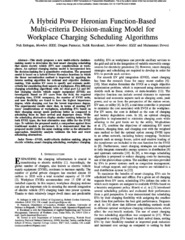Please use this identifier to cite or link to this item:
https://rfos.fon.bg.ac.rs/handle/123456789/2517Full metadata record
| DC Field | Value | Language |
|---|---|---|
| dc.creator | Erdogan, Nuh | |
| dc.creator | Pamučar, Dragan | |
| dc.creator | Kucuksari, Sadik | |
| dc.creator | Deveci, Muhammet | |
| dc.date.accessioned | 2023-05-12T11:51:20Z | - |
| dc.date.available | 2023-05-12T11:51:20Z | - |
| dc.date.issued | 2023 | |
| dc.identifier.issn | 2332-7782 | |
| dc.identifier.uri | https://rfos.fon.bg.ac.rs/handle/123456789/2517 | - |
| dc.description.abstract | This study proposes a new multicriteria decision-making (MCDM) model to determine the best smart charging scheduling that meets electric vehicle (EV) user considerations at workplaces. An optimal charging station model is incorporated into the decision-making for a quantitative evaluation. The proposed model is based on a hybrid power Heronian functions in which the linear normalization method is improved by applying the inverse sorting algorithm for rational and objective decision-making. This enables EV users to specify and evaluate multicriteria for considering their aspects at workplaces. Five different charging scheduling algorithms with ac dual-port L2 and dc fast charging (DCFC) EV supply equipment (EVSE) are investigated. Based on EV users from the field, the required charging time, EVSE occupancy, the number of EVSE units, and user flexibility are found to have the highest importance degree, while charging cost has the lowest importance degree. The experimental results show that in terms of meeting EV users' considerations at workplaces, scheduling EVs based on their charging energy needs performs better when compared with scheduling them by their arrival and departure times. While the scheduling alternatives display similar ranking behavior for both EVSE types, the best alternative may differ for the EVSE type. To validate the proposed model, a comparison against three traditional models is performed. It is demonstrated that the proposed model yields the same ranking order as the alternative approaches. Sensitivity analysis validates the best and worst scheduling alternatives. | en |
| dc.publisher | IEEE-Inst Electrical Electronics Engineers Inc, Piscataway | |
| dc.rights | openAccess | |
| dc.source | IEEE Transactions on Transportation Electrification | |
| dc.subject | workplace charging | en |
| dc.subject | Sorting | en |
| dc.subject | Smart charging | en |
| dc.subject | smart charging scheduling | en |
| dc.subject | plug-in electric vehicles (EVs) | en |
| dc.subject | multicriteria decision-making | en |
| dc.subject | Job shop scheduling | en |
| dc.subject | Employment | en |
| dc.subject | Electric vehicle supply equipment (EVSE) | en |
| dc.subject | Decision making | en |
| dc.subject | Costs | en |
| dc.subject | Charging stations | en |
| dc.title | A Hybrid Power Heronian Function-Based Multicriteria Decision-Making Model for Workplace Charging Scheduling Algorithms | en |
| dc.type | article | |
| dc.rights.license | ARR | |
| dc.citation.epage | 1578 | |
| dc.citation.issue | 1 | |
| dc.citation.other | 9(1): 1564-1578 | |
| dc.citation.rank | M21~ | |
| dc.citation.spage | 1564 | |
| dc.citation.volume | 9 | |
| dc.identifier.doi | 10.1109/TTE.2022.3186659 | |
| dc.identifier.fulltext | http://prototype2.rcub.bg.ac.rs/bitstream/id/937/2513.pdf | |
| dc.identifier.rcub | conv_2899 | |
| dc.identifier.scopus | 2-s2.0-85133746371 | |
| dc.identifier.wos | 000965918200001 | |
| dc.type.version | publishedVersion | |
| item.cerifentitytype | Publications | - |
| item.fulltext | With Fulltext | - |
| item.grantfulltext | open | - |
| item.openairecristype | http://purl.org/coar/resource_type/c_18cf | - |
| item.openairetype | article | - |
| Appears in Collections: | Radovi istraživača / Researchers’ publications | |
SCOPUSTM
Citations
14
checked on Nov 17, 2025
Page view(s)
2
checked on Dec 28, 2025
Download(s)
8
checked on Dec 28, 2025
Google ScholarTM
Check
Altmetric
Items in DSpace are protected by copyright, with all rights reserved, unless otherwise indicated.

